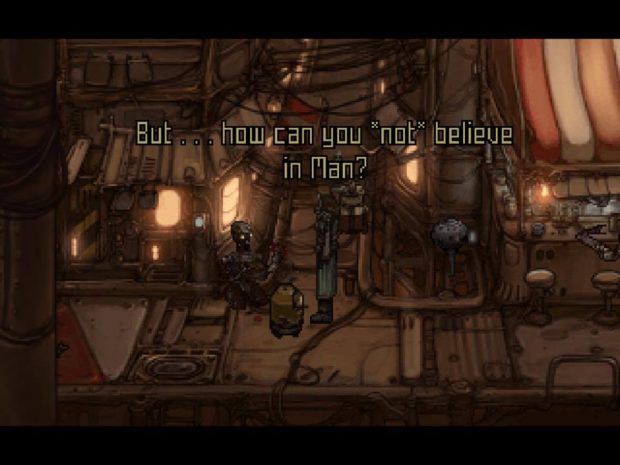 Of all the adventure games I’ve reviewed for this site, this is probably my favorite. The writing is stellar, the voice acting is ace, the style is top notch, and the soundtrack perfectly sets the tone. What is this game upon which I lavish such high praise? It’s an adventure game called Primordia ($4.99). A very modern adventure game with a very old school feel, where the puzzles are challenging but not because they’re goofy and absurd. Puzzles and interactions serve the story and characters first, in a bleak post-apocalyptic world that is very well built. And the kicker? Nary a human being in site. This is a robot’s world now, though humans still play a pivotal role.
Of all the adventure games I’ve reviewed for this site, this is probably my favorite. The writing is stellar, the voice acting is ace, the style is top notch, and the soundtrack perfectly sets the tone. What is this game upon which I lavish such high praise? It’s an adventure game called Primordia ($4.99). A very modern adventure game with a very old school feel, where the puzzles are challenging but not because they’re goofy and absurd. Puzzles and interactions serve the story and characters first, in a bleak post-apocalyptic world that is very well built. And the kicker? Nary a human being in site. This is a robot’s world now, though humans still play a pivotal role.
Developed by Wormwood Studios, this is another publishing endeavor by Wadjet Eye Games, who also published Gemini Rue ($4.99), which I also really enjoyed. Funnily enough, both games draw elements of Blade Runner in their setting and tone. Wadjet Eye is no stranger to adventure games, also acting as developer on games like The Shivah ($1.99) and The Blackwell Series ($2.99). I’ve sampled much of their library, and personally, this is my favorite. It was originally released back in December of 2012 to a great reception from general gamers, though slightly less favorable reviews from bigger gaming outlets. A lot of praise is due to the writing of Mark Yohalem who was one of the handful of people working on this gem of a game, all of whom were crucial to its luster. But, I’ll talk about them later.
The game is quick to put you into the action without a lot of exposition. You play as Horatio NullBuilt along with his sarcastic, quippy, armless Bro-bot sidekick Crisper HoratioBuilt. And now you can see the interesting naming conventions in this robot society; a given name followed by the builder and the word ‘built.’ This serves to help you differentiate connections between the various characters you meet while also setting this world apart as something unique. Horatio spends his days fixing and building whatever he can of his crashed ship, the UNNIIC (said “Unique” which is apt). As he fixes the telescope atop the ship making banter with his (…son?) Crisper, suddenly there is an ominous rumble followed by the immediate theft of their only power core, which they kind of need to survive. The thief is a tanky floating death bot called SCRAPER, and he’s like a robotic mix between HAL 9000 and Jason Voorhees.
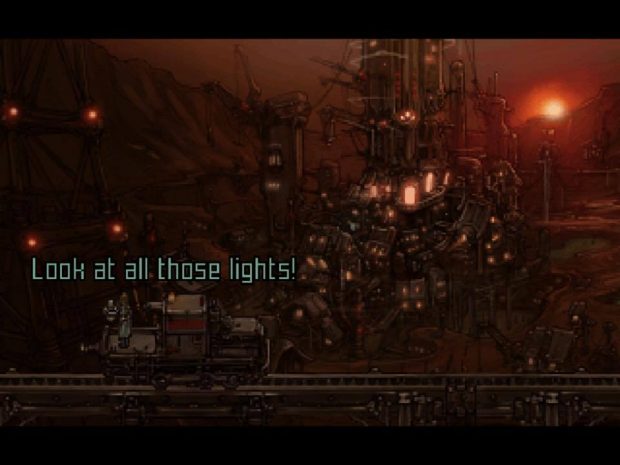
Thus begins our adventure puzzling, which is shockingly logic driven. Like almost all of the time. I’ve often praised modern adventure games for being less nonsensical with their puzzles than those of 15 to 20 years ago, though these days they’re also usually on the brainless side. With a few exceptions, Primordia avoids these pitfalls. One or two nonsense moments and one or two insanely difficult puzzles that I had to crack a guide for, but like Goldilocks and her rampant disregard for personal property, you’ll find plenty that are just right. Crisper acts both as comic relief and literal hint machine. He actually isn’t annoying. He’s not dropping gut busters but I didn’t cringe at any of his lines, delivered by Wadjet Eye veteran Abe Goldfarb. Speaking of voice work, if you played Bastion ($4.99) you might recognize the dulcet tones of Horatio’s voice as belonging to Logan Cunningham, also known as Rucks, also known as the Narrator, also known as one of the best things about Bastion. He isn’t in ultimate bass mode here, but he does great.
Mechanically the game is smooth and the interface is intuitive. Slide your finger over objects to see if they’re interactive or just hold your finger in one spot for a couple seconds to highlight all interactive objects. Then you can look at, use, or send Crisper to use them in whatever way the game deems appropriate. Tap the top of the screen to bring out your data pad and inventory. Drag items onto other items or environment stuff to make stuff happen. All the basics.
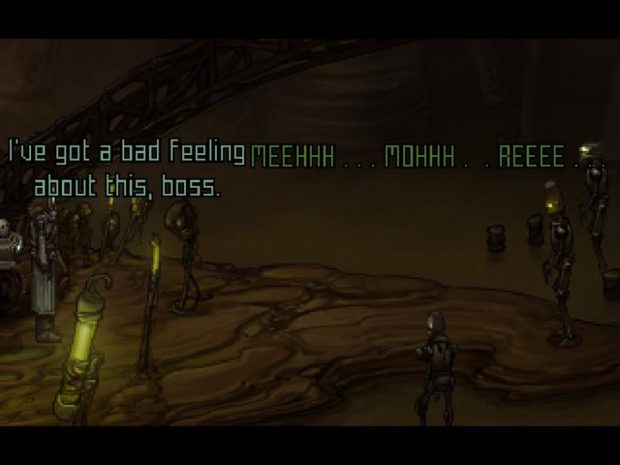
The data pad is neat in that it isn’t an obvious quest log or hint book. It’s reminiscent of Nathan Drake’s notebook in the Uncharted series. It actually reads like someone playing the game was taking notes on everything, not knowing exactly what would be important information. This gives the puzzles a more organic feel and ups the challenge by a metric ton. And even then you might want to take note of some things. Crispin’s hint system is on a timer along with his random joke/observation system. Stand around long enough and he’ll have something to say about your current objective or scene.
The first third of the game takes place in the dunes, where the UNNIIC crashed and our heroes live. Though in all this time, they haven’t explored very far. The latter portion of the game resides in Metropol, city of glass and light where energy is free for all, which is not only a bustling robot metropolis, but the last bustling robot metropolis. Last living city on the planet for all we know. Energy is scarce and resources are running dry, on a planet covered in sandstorms and acid rains. It’s here that you’ll come to truly understand the history of this world, learning about the last known humans, the war of the 4 cities, and the original self-efficient/sustaining/reproducing machines with the surname of ManBuilt. The backstory and lore of the world and characters, specifically Horatio, is drip fed to us at an excellent pace.
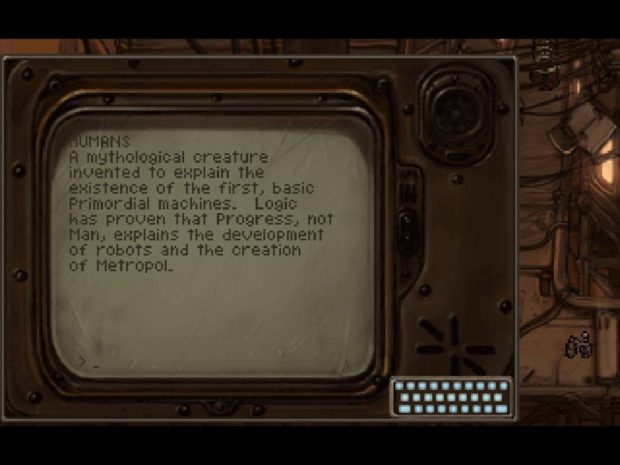
You see, in this world, Man is legend. That’s capital ‘M’ man as in capital ‘G’ god. Man is revered as the creators of everything, but true to post-apocalyptic form, most information has been lost to ruin, and people’s interpretations are a bit off. In this world Man was the perfect machine, who created all other machines to build and to maintain the world. You can even find The Word of Man in Horatio’s quarters right at the beginning, and it’s an actual super short gospel book that you can read. The truth is revealed over time, but this is my kind of world building. The game doesn’t skimp on opportunities to comment a little bit on the nature of religion in a world of Progress, but that’s not the primary focus and there are no direct attacks.
The more prominent themes in the game involve ideas of freedom. The main antagonist of the game is soon revealed to be a super computer that runs the entirety of Metropol called MetroMind. She represents the collective, while Horatio is the individual. She commandeers his power core for the greater good, potentially dooming Horatio who just wants to be left alone. It’s a story of authoritarianism and libertarianism in a world so on the brink of death that both actually have an extremely strong case. On one hand, more robots will live longer with Horatio’s core, but on the other it’s a brief and temporary solution at best. Of course, MetroMind is not just some innocent socialist. She does monstrous and downright evil things. But in the end, so can you as Horatio.
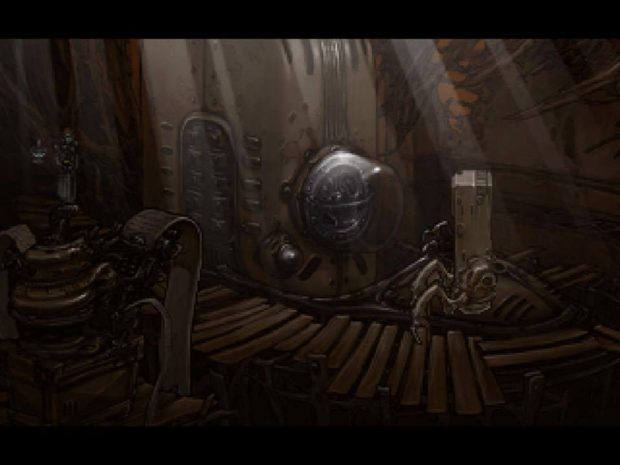
Horatio is very much a pacifist creator for most of the game, but by the end, after he’s been put through the ringer, you have several options available to you. There are 7 endings available, and more of them will leave you feeling a little… empty; a little conflicted, than not. But depending on your perspective, pretty much all of them can be seen as a canon ending. The game also brings up ideas of rigidity and logic versus mercy in the law, primarily through the third party member, who makes for a great third act addition. Most of these themes are only touched upon, this isn’t a philosophical treatise or anything, but there is just enough substance there to really engross someone who likes to think about these ideas.
They have a lot of fun playing with computer terminology, mostly in ways that actually make sense. The universal curse word of Primordia is B’sod, which was inspired by BSOD or Blue Screen of Death, though that’s not what it means in this world. You can turn on the developer commentary at any time. Though unlike, say, Whispered World ($4.99) as just an example, the commentary is all relevant to the themes, references, ideas, music choices, and art. There aren’t any personal stories that have nothing to do with the game. No offense to the WW guys, but this is how I want my game commentary. It’s quite insightful, though several plot points and puzzles will be outright spoiled in them, so you have been warned. I played through the game twice. The first time I went in blind, missed a bunch of stuff, and used a guide on several latter puzzles, didn’t get a great ending. That playthrough took about 5 hours. For my second playthrough I followed a guide to get every achievement and ending and listened to every commentary track, and that one took me about 6 and change. More story but less time puzzling.
It’s not a perfect game, but it’s pretty B’sodding great. Composer Nathaniel Chambers sets the mood with his synth soundtrack, supporting the original concept of artwork of Victor Pflug. The artwork, while not the highest resolution, lends a gritty feeling to everything. It’s reminiscent of Machinarium ($6.99), though Machinarium is more lighthearted and whimsical like WALL-E whereas this is more nihilistic and dismal like Blade Runner. In a good way though. Some splash screens are a tad too pixelated I guess, but they didn’t bother me much. Aside from one achievement that is bugged and 3 times that the sound randomly cut out on me, I encountered no bugs or crashes. With a great grey-morality world and characters, design that offers multiple solutions to several puzzles, and original sci-fi story, I can’t recommend Primordia enough to anyone who’s ever enjoyed an adventure game.
P.S. You can get a PC or Mac Demo as well as links to their free supplementary Primordia story “Fallen" and even some Let’s Play recommendations if you don’t want to actually play on the dev page here.
